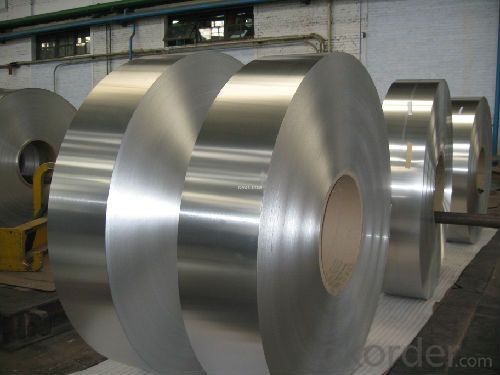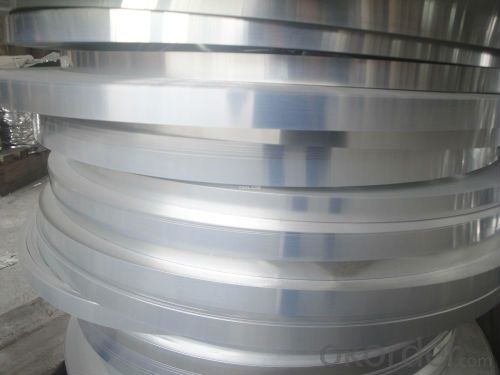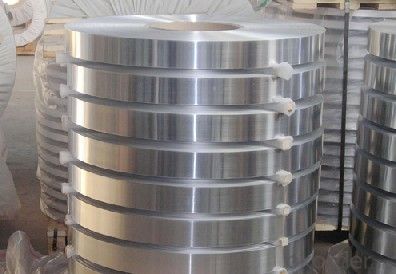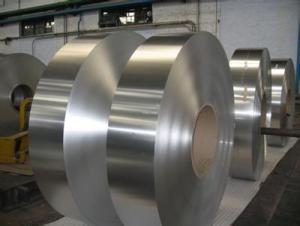Aluminium Weather Strip Seal
- Loading Port:
- China Main Port
- Payment Terms:
- TT or LC
- Min Order Qty:
- 8 m.t.
- Supply Capability:
- 2000 m.t./month
OKorder Service Pledge
OKorder Financial Service
You Might Also Like
Structure of Aluminium Weather Strip Seal Description:
They can be used in many field,such as: Building, curtain wall, ceiling, panels, transformers, food packaging, air conditioning, condenser, air filter, refrigerators, washing machines, solar energy, automobile manufacturing, ship manufacturing, machinery manufacturing, electric equipment such as cosmetic packaging, machinery manufacturing industry, can also be used in power plants, chemical anti-corrosion insulation in petrochemical industry, etc.
Main Features of Aluminium Weather Strip Seal:
a. Excellent corrosion resistence
b. Satisfactory anodizing
c. Conversion coating finishing characteristics
d. It is unmatched by any other commercial aluminum alloy in workability.
e. Readily to welding ,brazing, and soldering.
Images of Aluminium Weather Strip Seal:



Aluminium Weather Seal Specification:
Item | Aluminum coil,Aluminum strip |
Standard | GB/T3190-2008,GB/T3880-2006,ASTM B209,JIS H4000-2006,etc |
Material | 1060,1200,1100,a1100P,3003,3004,5052,5652,5154,5254,5454,5083,5086,5056,5456, 2A12,2024,2014,6061,6063,7075,etc |
Thickness | 0.1-200mm |
Width | 2-2200mm |
Temper | T3-T8,O-H112,T351-T851,etc |
Unit weight | 5-15 tons per coil |
Price term | Ex-Work,FOB,CNF,CFR,CIF,FCA,DDP,DDU,etc |
Payment Term | TT,L/C,Western Union |
MOQ | 8000Kg |
FAQ of Aluminium Weather Seal:
a.What is monthly capacity
---CNBM is one stated own company and our monthly capacity is about 2000tons.
b. Now which countries do you export your goods?
---Now we export to South East Asia,Africa, North America,South America ect.
- Q:What are the regulations and standards governing the production of aluminum coils?
- The production of aluminum coils is governed by a variety of regulations and standards to ensure product quality, safety, and environmental sustainability. These regulations may vary depending on the country or region, but there are some common industry standards that are widely recognized. One of the primary regulations governing the production of aluminum coils is related to product quality and specifications. Aluminum coils must meet specific standards set by organizations such as the American Society for Testing and Materials (ASTM) or the International Organization for Standardization (ISO). These standards define the physical and chemical properties that the aluminum coils must possess, such as thickness, width, tensile strength, and chemical composition. In terms of safety, there are regulations in place to protect workers and facilities involved in the production process. Occupational Safety and Health Administration (OSHA) regulations, for example, outline safety measures and requirements to prevent accidents and ensure safe working conditions. This may include guidelines for handling and storing aluminum coils, personal protective equipment requirements, and emergency response protocols. Additionally, environmental regulations play a crucial role in the production of aluminum coils. These regulations aim to minimize the impact of the production process on the environment and ensure sustainable practices. For instance, there may be regulations regarding the treatment and disposal of waste materials, the use of energy-efficient equipment, and the reduction of greenhouse gas emissions. Furthermore, industry-specific organizations such as the Aluminum Association in the United States or the European Aluminium Association in Europe also establish voluntary standards and best practices for the production of aluminum coils. These organizations work closely with manufacturers to develop guidelines for quality control, sustainability, and continuous improvement in the industry. Overall, the production of aluminum coils is governed by a combination of regulations and standards that encompass product quality, safety, and environmental considerations. Compliance with these regulations ensures the production of high-quality aluminum coils that meet customer requirements and contribute to a sustainable and responsible industry.
- Q:Can aluminum coils be used for solar panel applications?
- Solar panel applications can utilize aluminum coils, which are lightweight and durable materials commonly employed in solar panel construction. Aluminum, an excellent conductor of electricity, is ideal for capturing and conducting solar energy. These coils can serve as backing materials for solar panels, offering structural support and aiding in heat dissipation. Furthermore, aluminum possesses good corrosion resistance, a crucial characteristic for solar panels exposed to diverse weather conditions. Ultimately, the strength, conductivity, and corrosion resistance of aluminum coils render them a favored choice for solar panel applications.
- Q:I'm asking about the aluminum tabs on soda cans. I've heard mixed things.
- Yes, if you are willing to drive and deliver the aluminum tabs to a recycling site, you can probably be reimbursed for the tabs. However, if you'd rather just donate them to a great cause, you can send them to Shriner's Hospitals, or someone you know locally who is involved with Shriner's. I'm sure they would gladly deliver them when they visit with thier sick child for treatment at these free hosiptals! If you don't know of anyone who uses the Shriner's Hospital services, please email me back and I'll make arrangements for your pop-tabs to get to the Shriner's Hospital in Philadelphia, PA every 3 months or so. My child visits them every 3 months!!!!
- Q:Can aluminum coils be used in the production of aluminum windows?
- Indeed, it is possible to utilize aluminum coils for the fabrication of aluminum windows. Typically, aluminum coils are employed as a primary component during the manufacturing stage of aluminum windows. These coils are commonly crafted from top-notch aluminum and subsequently transformed into slender, level sheets. Subsequently, these sheets can be tailored and molded to achieve the desired dimensions and aesthetics for the window frames. As a consequence of its sturdiness, lightweight composition, and corrosion resistance, aluminum is frequently chosen as the preferred material for window frames. By incorporating aluminum coils into the production of aluminum windows, manufacturers can streamline their operations, reduce costs, and ultimately deliver a final product of exceptional quality.
- Q:What is the cost-effectiveness of using aluminum coils in the long run?
- The use of aluminum coils in the long term can yield significant cost-effectiveness. Despite the initial higher cost compared to materials like copper, aluminum coils offer long-term advantages that make them a wise choice. To begin with, aluminum coils exhibit exceptional resistance to corrosion, which means they are unlikely to deteriorate over time. Consequently, they have a longer lifespan and require less maintenance, resulting in reduced costs. Additionally, aluminum coils possess high heat transfer efficiency, enhancing energy efficiency and lowering energy consumption. Moreover, aluminum is a lightweight material, making it more economical and easier to transport and install compared to heavier alternatives. This leads to reduced labor costs during installation or replacement. Another factor that enhances the cost-effectiveness of aluminum coils is their recyclability. Aluminum is highly recyclable, and the scrap value of aluminum coils can offset the initial investment. Furthermore, the use of recyclable materials aligns with sustainability objectives and can contribute to a positive brand image and reputation. In summary, despite the higher upfront cost, aluminum coils offer long-term benefits such as corrosion resistance, energy efficiency, recyclability, and reduced maintenance and labor costs. Consequently, they are a cost-effective choice in the long run.
- Q:Can aluminum coils be used in electrical cables?
- Yes, aluminum coils can be used in electrical cables. Aluminum is a commonly used material for electrical conductors due to its excellent electrical conductivity and relatively low cost compared to copper. It is especially used in power transmission and distribution cables where long-distance transmission is required. Aluminum coils are often used in overhead power lines and underground cables. However, it is important to note that aluminum has a lower tensile strength than copper, so the cables need to be properly designed and manufactured to ensure adequate mechanical strength. Additionally, aluminum conductors require larger cross-sectional areas compared to copper to achieve the same electrical performance, which can result in slightly larger cable sizes.
- Q:How does the gauge of aluminum coils affect their performance?
- The gauge of aluminum coils refers to the thickness of the aluminum sheet used to manufacture the coil. The gauge is typically measured in terms of its thickness, with a smaller gauge indicating a thicker sheet. The gauge of aluminum coils has a significant impact on their performance. Firstly, the gauge affects the strength and durability of the aluminum coil. Thicker gauges provide increased strength and resistance to bending or warping, making them suitable for applications that require robust and long-lasting coils. On the other hand, thinner gauges are more flexible but may be prone to damage or deformation, making them suitable for less demanding applications. Secondly, the gauge affects the thermal conductivity of the aluminum coil. Thicker gauges have lower thermal conductivity, meaning they are slower to heat up or cool down. This can be advantageous in certain applications where temperature control is crucial, as it helps to maintain a stable environment. Thinner gauges, on the other hand, have higher thermal conductivity, allowing for faster heat transfer. This can be beneficial in applications that require rapid heating or cooling. Thirdly, the gauge affects the weight and cost of the aluminum coil. Thicker gauges are heavier and generally more expensive due to the increased amount of material used. This can be a consideration in applications where weight or cost is a significant factor. Thinner gauges, being lighter and less expensive, can be more suitable for applications where weight reduction or cost efficiency is important. Lastly, the gauge affects the ease of fabrication and formability of the aluminum coil. Thinner gauges are more easily bent, shaped, or formed into desired configurations, making them suitable for applications that require intricate or complex designs. Thicker gauges, while less malleable, can still be formed but may require specialized equipment or processes. In conclusion, the gauge of aluminum coils has a direct impact on their performance. It affects their strength, durability, thermal conductivity, weight, cost, and formability. Therefore, selecting the appropriate gauge for a specific application is essential to ensure optimal performance and efficiency.
- Q:Can aluminum coils be used in food processing industries?
- Yes, aluminum coils can be used in food processing industries. Aluminum is a widely used material in food processing due to its numerous advantageous properties. It is lightweight, flexible, and has excellent thermal conductivity. These qualities make aluminum coils ideal for applications such as refrigeration, heat exchangers, and ovens in the food processing industry. Additionally, aluminum is non-toxic, corrosion-resistant, and does not impart any odor or taste to the food products being processed. This makes it a safe and hygienic choice for food processing equipment. Furthermore, aluminum coils are easy to clean and maintain, which is crucial in maintaining the highest standards of cleanliness and food safety. Overall, aluminum coils are widely accepted and used in food processing industries due to their superior performance and suitability for food-related applications.
- Q:What is an aluminum coil?
- An aluminum coil is a continuous strip or sheet of aluminum that is wound into a coil shape. It is typically used in various industries for its lightweight, corrosion-resistant, and malleable properties. The coil is produced through a process called continuous casting and rolling, where molten aluminum is poured into a caster and then rolled between large metal rollers to achieve the desired thickness and shape. Aluminum coils are commonly used in the manufacturing of automotive parts, building materials, electrical equipment, and packaging materials. They can be further processed into different forms, such as sheets, plates, or foils, depending on the specific application requirements.
- Q:What are the different types of surface finishes for decorative purposes?
- For decorative purposes, a variety of surface finishes are commonly used. These finishes can improve the appearance of a surface by adding texture, depth, and visual interest. Some of the most popular surface finishes for decorative purposes include: 1. Polished: Achieving a smooth and shiny surface, polished finishes create a reflective appearance. This glossy look is obtained by using abrasive materials to polish the surface. 2. Matte: Matte finishes have a flat and non-reflective surface. They are achieved by using sandpaper or other materials to create a smooth yet dull appearance. Matte finishes are often chosen for a more subtle and understated aesthetic. 3. Brushed: Creating a distinctive linear pattern, brushed finishes are achieved by brushing the surface with a wire brush or abrasive material. This finish is commonly used on metals like stainless steel, resulting in a textured and visually interesting appearance. 4. Textured: Textured finishes involve incorporating patterns or designs onto the surface through various techniques such as embossing, engraving, or applying a textured coating. These finishes add depth and dimension to a surface, creating a unique and visually appealing effect. 5. Antiqued: Designed to imitate the appearance of aged or weathered surfaces, antiqued finishes can be achieved through techniques like distressing, staining, or adding a patina. These finishes are often used to create a vintage or rustic look. 6. Metallic: Metallic finishes utilize metallic pigments or coatings to create a shiny and reflective appearance. This finish adds a touch of elegance and sophistication to a surface, making it a popular choice for decorative purposes. 7. High gloss: High gloss finishes have an extremely smooth and reflective surface, resembling a mirror-like effect. This finish is achieved by applying multiple layers of clear coat or lacquer and polishing the surface to a high shine. High gloss finishes are often chosen to create a modern and luxurious look. In conclusion, the selection of a surface finish for decorative purposes depends on the desired aesthetic and the type of material used. Each finish possesses unique qualities that can significantly enhance the overall visual appeal of a surface.
1. Manufacturer Overview |
|
|---|---|
| Location | |
| Year Established | |
| Annual Output Value | |
| Main Markets | |
| Company Certifications | |
2. Manufacturer Certificates |
|
|---|---|
| a) Certification Name | |
| Range | |
| Reference | |
| Validity Period | |
3. Manufacturer Capability |
|
|---|---|
| a)Trade Capacity | |
| Nearest Port | |
| Export Percentage | |
| No.of Employees in Trade Department | |
| Language Spoken: | |
| b)Factory Information | |
| Factory Size: | |
| No. of Production Lines | |
| Contract Manufacturing | |
| Product Price Range | |
Send your message to us
Aluminium Weather Strip Seal
- Loading Port:
- China Main Port
- Payment Terms:
- TT or LC
- Min Order Qty:
- 8 m.t.
- Supply Capability:
- 2000 m.t./month
OKorder Service Pledge
OKorder Financial Service
Similar products
New products
Hot products
Related keywords




























